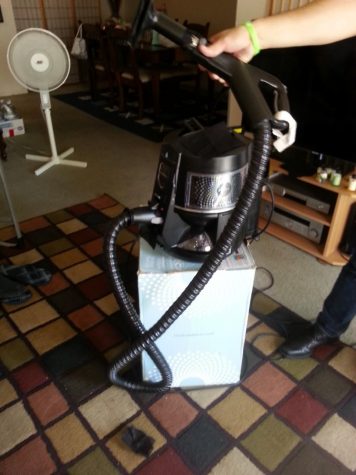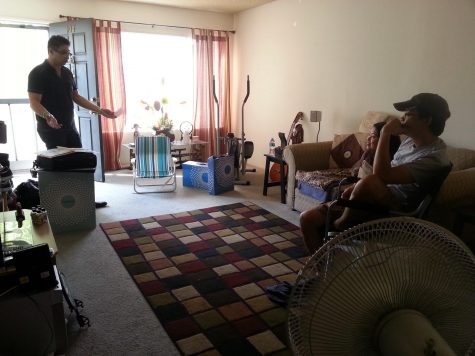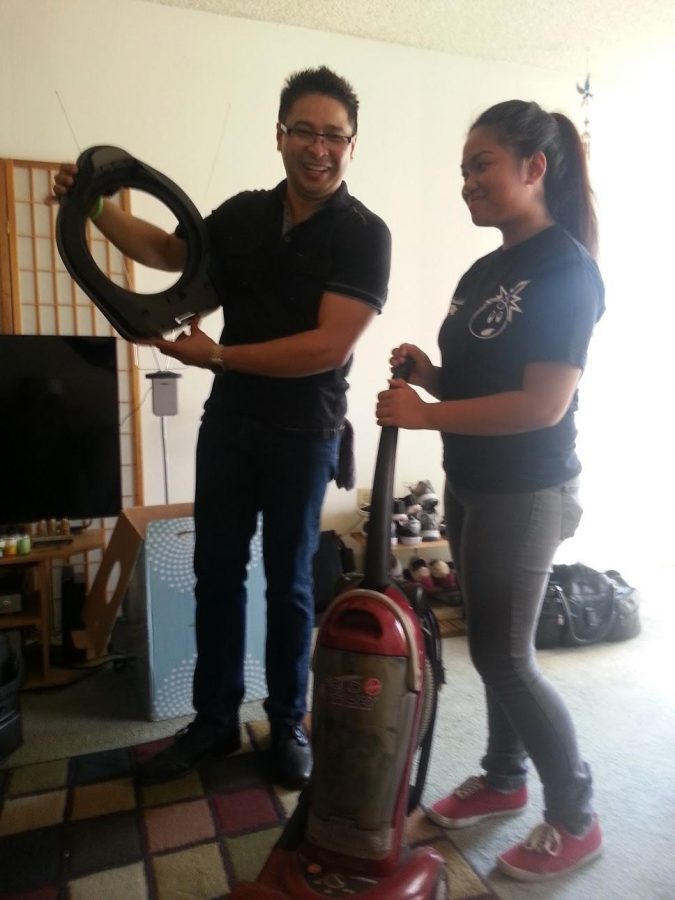A college program introduces me into the world of marketing
November 17, 2014
My training manager and I comparing the parts of the Rainbow Air Purifier to a regular vacuum.
A college program that pays at least $40 for an hour and a half of work beats a part-time job at Starbucks any day. A majority of students, however, often participate in more common, minimum wage jobs.
According to the Department of Labor, the top jobs for young people are camp jobs (such as camp counselors, instructors, lifeguards or coaches), self-employment jobs (like washing cars, doing lawn work and landscaping, pet sitting, or babysitting or daycare), food service jobs (such as waiting or bussing tables, host or hostess, cook, or cashier), and retail jobs (like sales, merchandising or customer service). The Department of Labor also states that 26 percent of students from the ages of 16 to 24, accepted jobs in the food and hospitality services, with another 19 percent in retail.
Along with this 19 percent of teens, I recently decided to participate in a sales job. RBW Dyna Air Incorporation, a company that focuses on the cleaning power of water found in air purifiers, introduced a new college program during the summer of 2014. The program gives an opportunity for college students to experience direct sales. Students incorporate their leadership skills and gain confidence by doing public speaking. Seeing this as an opportunity to improve my work skills, I joined this company earlier this year.

The body of the main product the company sells. (Air Purifier)
People have different views on jobs such as these. Many door-to-door, or referral, jobs are seen as pyramid schemes, where one person is at the top and recruits others to market the product in order to obtain a share of their profits.
Elaine Snodgress, business teacher and ASB advisor, questions the validity of some of these marketing/sales operations, due in part to her encounters with such companies l these. “I would receive marketing calls around dinner time, because that’s when they know you’re home, and it’s annoying,” she said. “I also don’t like the fact of someone walking around my neighborhood, that’s not from my neighborhood, trying to sell me something or pitching a product that I don’t need.”
Randy Tiffany, work experience and work permit coordinator, however, believes that there are some legitimate companies out there that engage in direct sales. “There’s people that make a lot of money in that business, and there’s legit money,” he said. “Some people think it may be a pyramid scheme, but it’s not, because you don’t start making money until people below you make money.”
Almira Tan, a marketing manager for RBW Dyna Air, handles all the paperwork and logs demos and hours of the company’s workers. She shares a similar perspective as Tiffany. She feels that this job does more than just pay a student. “This program educates students on how to build their own business while they are young,” she said. “For them to save while in school, and for them to learn how to manage their own time, be their own boss, and have good attitude with positive vibes towards people, impacts the student and their future.”
The program was introduced by the company’s president, Rowland Mungues, who initiated the marketing job in the Glendale area. Having a friendship with his eighteen-year-old daughter, Nicole Mungues, who is also the direct sales associate and marketing director of the business, she was able to bring a friend and me to a company open house.
To be qualified into the program, the teenager must either be a senior in high school or a college student. They must attend their first open house on a Monday as a talent scout, a recruit of someone already in the business, and listen through the presentation.
The meeting usually begins around 7:30 p.m., and ends at 9 p.m., but an open buffet dinner is served at 7 p.m., available for everyone. Everyone will be given a ticket when entering the building for a chance to win a prize. As a talent scout, I was given a ticket and a green paper I had to fill out, registering my first time attending the meeting. The paper also gave Nicole Mungues and me and a chance to win extra prizes.
In the college program, students are required to do at least ten demos, advertisements of the products, before officially graduating as a marketing dealer. If the students do not sell the products in those ten demos, they will receive a payment of $400. Within those ten demos, five of them must be training demos, advertisements done with a training manager. For every sale a student makes with a training manager, their commission will be $150.00. With every “solo sale” the commission rises $100 each time and the third or more solo sale would be $400. The best promo the company offers for the program is that after 30 demos done in two months time, the student has to make only one sale, and they will receive a “Super Commission” of $1500 for their education fund.
Going into the business, I had already obtained knowledge of what this job opportunity had in store for me. My mother had worked as a training manager and a marketing director for the business three years ago. From her experience, and my observations, I knew how the company’s products worked.
In order to market RBW Dyna Air’s products, I would have to demonstrate, or perform a demo, to a potential customer that I already have some sort of relationship with. I would ask them if I can show the business in their own home and set an appointment. Potential customers after that appointment can be scheduled through the customers’ recruits, or more of my own acquaintances.
In the beginning of every demo with a potential customer, I would introduce myself and thank the client for their time. “Hello, my name is AJ Garcia, and I just want to thank you all for letting me introduce a life changing product,” I said, while handing them two sheets of paper and a flyer.

My training manager giving a brief overview of the products that will be demoed to my two clients.
“The pink sheet of paper is a raffle entry for your family to win a grocery shopping spree of $2,000,” I said. “All you have to do is put names of ten friends on the lines below, and no number is needed.” “On the other sheet, it is required to put at least eight names of people you’d be willing to introduce the product to, for me to advertise,” I continued. “This form requires the name and numbers of the people but our company will not contact them without your permission.”
Lastly, I would mention the flyer which is actually a gift presented to the client for their time. “As our company knows time is valuable, we would like to thank you for giving us an opportunity to present our product with a paid off three days and two nights hotel room of any location our services offer,” I said.
After the intro, I would ask the client to join me in the kitchen to introduce the first product. “This is a small air purifier called the Rainmate, and you can put it in small places like the kitchen or the bathroom and it will santasize and aromatize the area with the use of oil-based scents,” I said. As I would explain this product, I would also show them how it operates.
When that’s done with, I will ask the client to join me back into the living room where I start advertisement of the main product. “What is the first thing you look for when buying a vacuum cleaner?” I asked. The usual response I would receive from most of my clients is “suction.” From there, I would begin to demo the product and explain how suction has no power to clean, without the power of air flow. I would also mention how the company’s products differ from other cleaning products because RBW Dyna Air uses the cleaning power of water.
The program seemed confusing to me at first, but with guidance from the staff, I had obtained the main goal of the college program: to be confident, positive and persistent.
“I encourage students to participate in this program because, no matter what students do in life or in their future career, they will always have the need to speak to other people, build an appropriate relationship with one another, and be confident in stepping out of their comfort zones,” Munges said. “And I believe this company effectively trains students in that matter, perfectly.”
Although Snodgress does not want to partake in companies like these, she feels that students do learn from businesses like these. “Kids learn how to be patient and how to accept rejection,” she said. “I think there are, however, better ways to make a living than that.”
Tiffany, on the other hand, thinks that these business teach youth valuable lessons for the working field. “You learn about you mostly, and how you deal with people,” he said. “This business teaches you that if you want a business like that, you need to hustle.”
